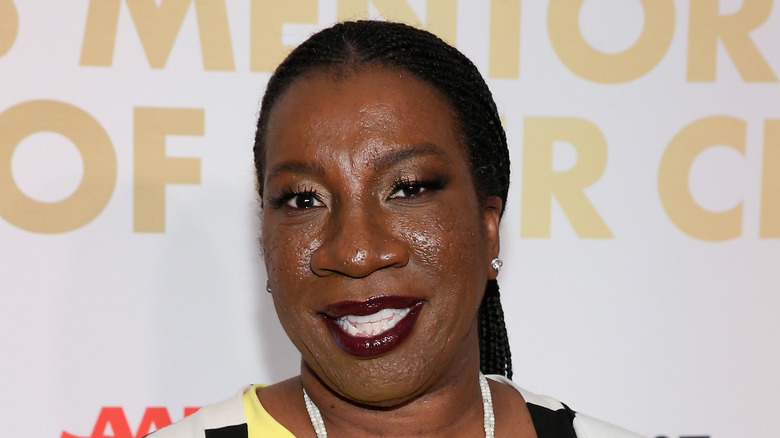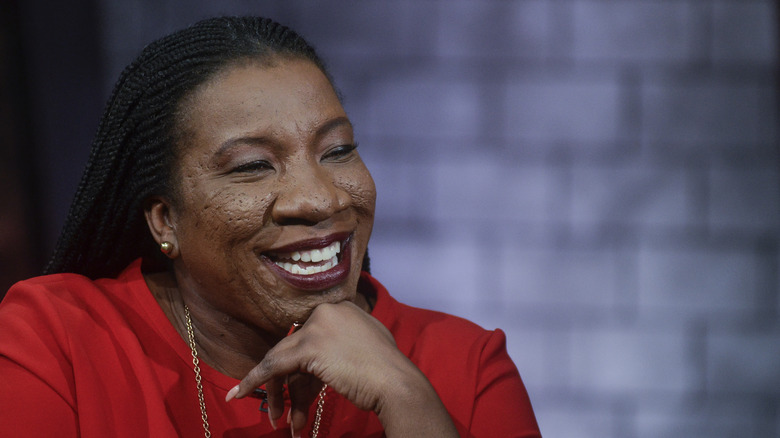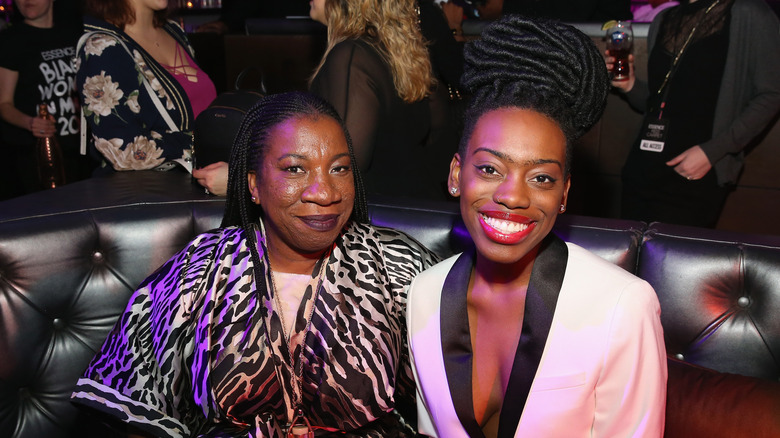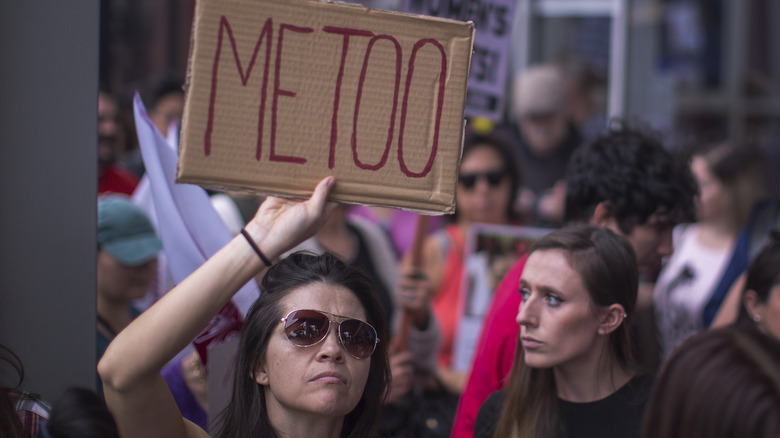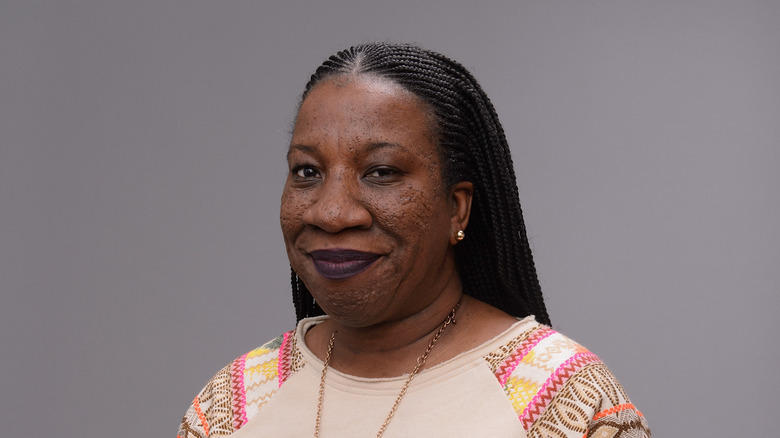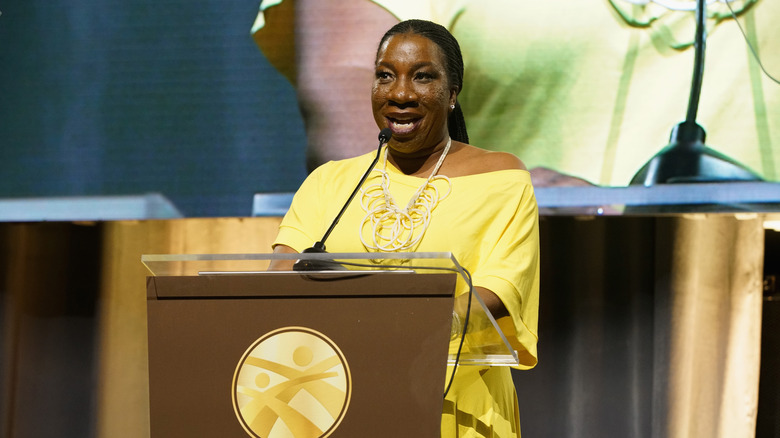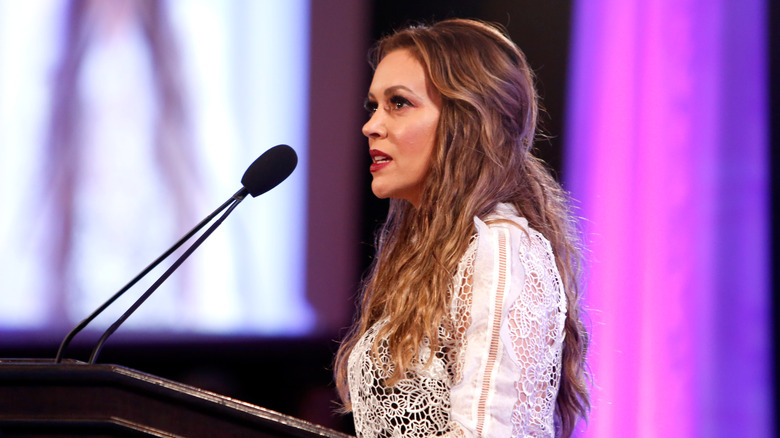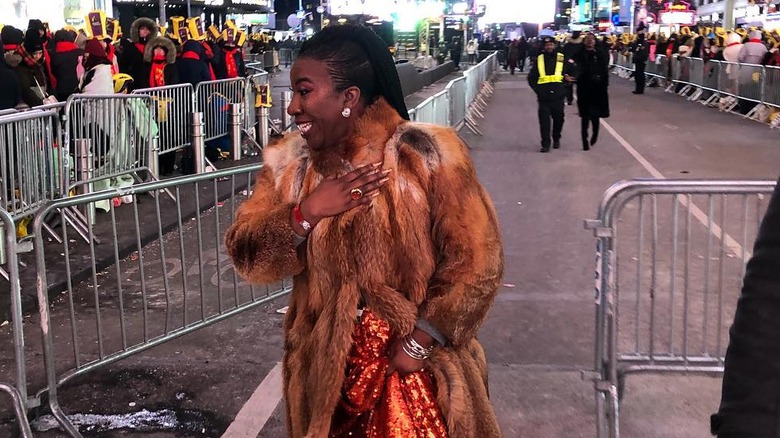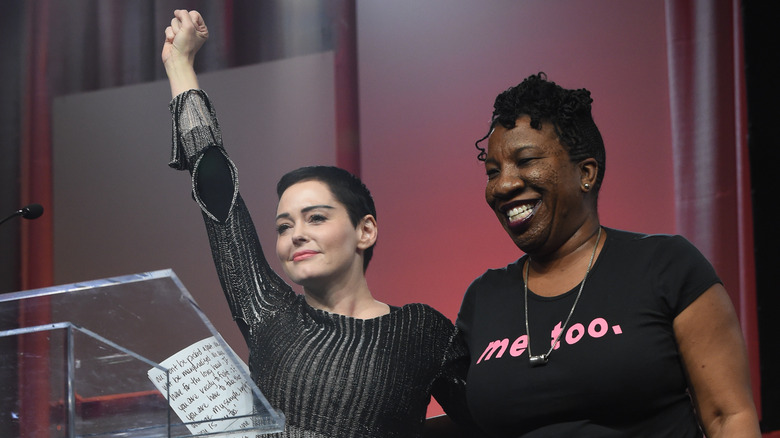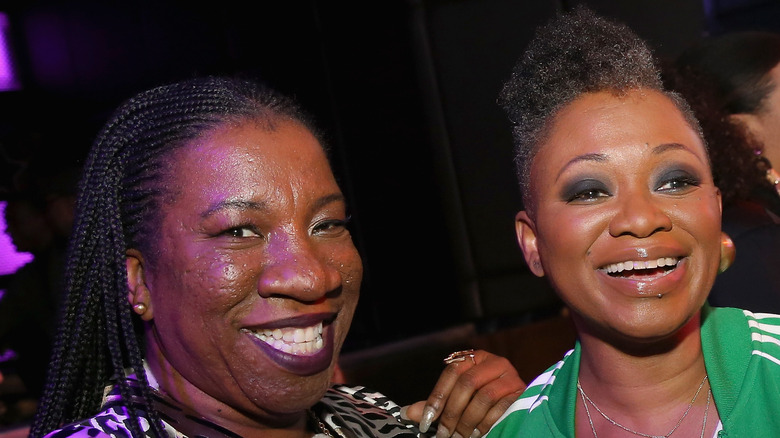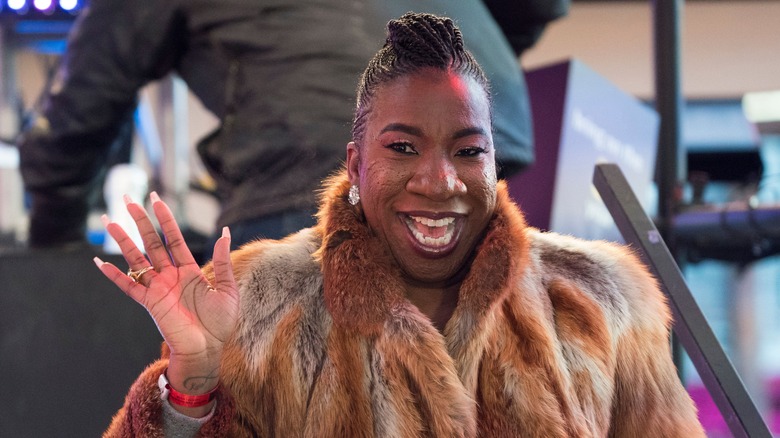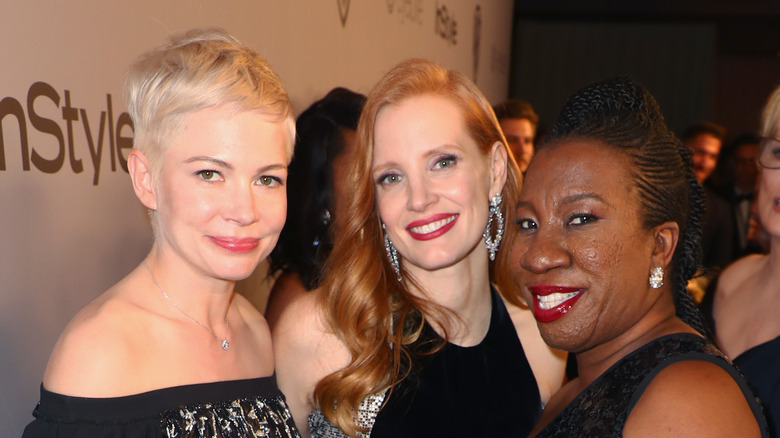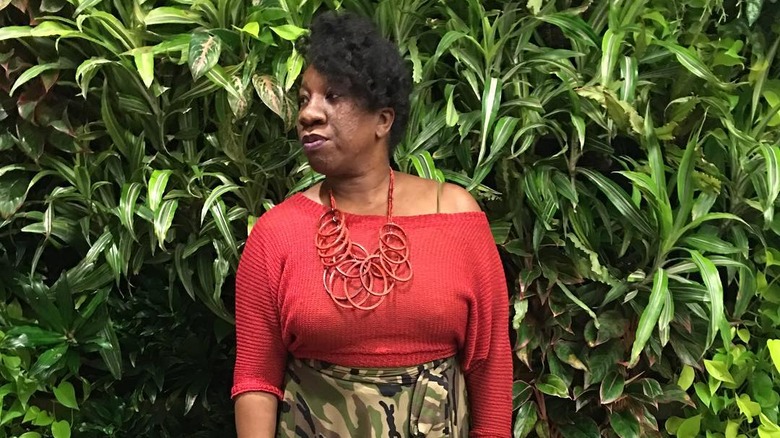Who Is The Woman Behind The #MeToo Movement?
The #MeToo movement has created a sea change for victims of sexual harassment and assault. Now more than ever before, women are speaking up about their experiences, and perpetrators are being called upon to account for their actions.
But where did the words that inspired this movement come from? What prompted Alyssa Milano to post the now viral #MeToo tweet that spread like wildfire across social media?
It turns out that the #MeToo movement has been active for over a decade, thanks to the inspired and dedicated work of Tarana Burke, an activist and advocate for young women of color. Here's what you should know about both her life and her incredible, important work.
She's a survivor
Tarana Burke, like so many women, is a survivor of sexual violence. She told Philadelphia newspaper The Inquirer that she was raped when she was only 6 years old, molested for several years by a neighborhood teenager, and raped again as an adult. She's also dealt with street harassment over the years, and a thwarted attempt by some neighborhood boys when she was younger.
Because of these experiences, Burke knows firsthand how important it is to find healing after these encounters. And she has dedicated her life to helping women — especially women of color — rebound from them. "I want the women I work with to find the entry point to where their healing is," she said. "Violence is violence. Trauma is trauma. And we are taught to downplay it, even think about it as child's play."
New York state of mind
Born and raised in the Empire State, Burke came of age in the 1970s and 1980s. And her upbringing had an impact on her. She told The Guardian, "I grew up in, not poverty — that sounds a bit Tiny Tim — but, you know, low-income, working-class family in a housing project in the Bronx. We didn't have a ton of resources."
Life might not have been easy, but Burke cites influences that fostered her development. She continued, "But my mother was very determined — she had me in all sorts of programmes; anything she could put me in, she did. And I read a lot when I was young. Those were the things that helped change the trajectory of my life."
It was reading, especially, that taught her that healing was possible. "And the first glimpses of healing, and understanding what had been happening to me as a child, came from the literature that I read," she said. "So I had this 'out' that I saw the girls I worked with did not have."
#MeToo isn't new
The #MeToo movement didn't start with Alyssa Milano's tweet. Rather, Burke coined the phrase in back in 2006 when she created the nonprofit Just Be Inc. to help young women of color.
In an interview with Yes magazine, Burke talked about the origins of the movement. She said, "My work started in support of Black and brown girls in the community in Alabama. And it grew to be about supporting Black and brown women and girls across the country. And beyond that it grew to be about supporting marginalized people in marginalized communities."
The work she was doing differs from the focus of the social campaign. She continued, "And so this iteration in social media has placed a larger focus on perpetrators being called out and held accountable for their actions. But the actual me too Movement is about supporting sexual assault survivors. So that's where it's different."
Inspiration from Heaven
Burke was inspired to use "me too" after a heartbreaking encounter with a young girl named Heaven. On the website for Just Be Inc., she wrote, "Heaven was a sweet-faced little girl who kind of clung to me throughout the camp. However, her hyperactive and often anger-filled behavior betrayed both her name and light, high-pitched voice and I was frequently pulling her out of some type of situation."
Heaven's behavior was merely a symptom, as her mother's boyfriend was sexually abusing her. But when she tried to confide in Burke about the abuse, Burke found herself overwhelmed. She continued, "I was horrified by her words, the emotions welling inside of me ran the gamut, and I listened until I literally could not take it anymore...which turned out to be less than 5 minutes. Then, right in the middle of her sharing her pain with me, I cut her off and immediately directed her to another female counselor who could 'help her better.'"
Burke immensely regrets that she couldn't help Heaven in that moment. "I couldn't help her release her shame, or impress upon her that nothing that happened to her was her fault," she wrote. "I could not find the strength to say out loud the words that were ringing in my head over and over again as she tried to tell me what she had endured."
Those words were "me too."
Passionate advocacy
Burke has been hard at work for social justice for a long time. She told Elle that she started as a teenager doing organizing work as part of the 21st Century Youth Leadership Movement when she was just 14.
Over the years she continued her work, and sharpened her focus along the way. "I've done work in every area of social justice you can think of, but I've been highly focused on young people and then specifically black and brown girls," she continued. "Somewhere around 2003, I started realizing that our girls, specifically black and brown girls, needed specific attention and so that's what I started honing in on."
Now she's a senior director for a nonprofit in Brooklyn called Girls for Gender Equity, which focuses on providing girls with leadership development around issues of gender equity and race. "I've done community organizing my whole life and I think to myself, as an organizer, we don't wait for people to come to us and say help us organize something, we go out into the community and we bring the skills to a group of people to organize themselves," Burke shared. "And I felt like I needed to bring this to the marginalized among us because they're not going to seek out these services."
She almost got left out
Burke may have created the "Me Too" slogan and movement years ago, but when Alyssa Milano's tweet went viral, Burke was not credited. Initially, she was worried that her life work would be co-opted, so she acted by sharing a video of her talking about #MeToo long before Milano's tweet.
She told Elle, "I don't want to position myself and say, 'Hey, I did this. Don't take away, you know, give me credit.' Because it's a natural response that people are expressing experiences like that, so I can't say people stole this from me, but what I can say is that there is work behind this."
Additionally, people — mostly black women — pointed out that Milano had appropriated Burke's slogan. Fortunately, Milano moved quickly to fix the omission. In an interview with Yes magazine, Burke said, "Alyssa Milano is not complicit in doing anything sinister to me. And when she found out about it, to her credit, she not only contacted me, she tweeted about it." According to Burke, Milano "made every effort" to ensure people knew this was Burke's work. Burke shared that she appreciates that level of support from Milano and that they've become friends in the process.
"But our work is inherently different," she shared. "Our goals are inherently different."
She had no idea she'd change the world
In an interview on the Today Show, when asked if the viral #MeToo campaign had exceeded her expectations, Burke replied, "I could never imagine this. I could never have envisioned something that would change the world. I was trying to change my community."
But that doesn't mean she's planning to rest, or that the work is close to being finished. "Well this is just a start. I've been saying from the beginning that it's not just a moment, it's a movement," she said. "I think now the work really begins. A hashtag is a declaration, but now we're poised to really stand up and do the work of it." So while she's already changed the world, there's still more to do, and everyone's help is needed.
Person of the year
In December 2017, Time magazine announced that their Person of the Year was a group they dubbed "The Silence Breakers."
Burke was named as one of The Silence Breakers, along with movie stars Ashley Judd and Rose McGowan, singer-songwriter Taylor Swift, and a host of other (mostly) women who refuse to be silent about sexual harassment and abuse.
And while Burke is extremely well-deserving of the honor, she was not featured on the cover, which upset many people, including filmmaker Melissa V. Murray. Murray penned an article for BET, and in it noted, "This was Tarana's moment. She's a very gracious woman and hasn't so much as uttered any displeasure about the cover. And probably won't. But I cannot sit silently why [sic] this Black woman has to stand in the shadows of her own creation so that others can take the credit."
Viral concern
For as much progress as the #MeToo movement has made for victims of sexual harassment and assault, Burke is concerned about potential fallout from the viral campaign.
She told CNN, "I think the viral moment is great but the amplification of that — I worry about disclosing their status as survivors en masse on social media and not having space to process. I worry about survivors coming on to social media and being bombarded with messages of 'me too.'"
The campaign presents a very real challenge for survivors, and opens the door for potential re-triggering. "Imagine your social media timeline is filled with sexual violence and you, too, are a survivor. That is traumatizing," Burke told Philadelphia newspaper The Inquirer. "If you make something [like this] viral, you have to be prepared to help people deal. You have to give people something else besides the disclosure."
Fashionista!
In addition to being an activist and advocate, Burke has a special interest in fashion. She maintains a blog called She Slays: A Practical Girl's Guide to Effortless Style, where she writes about style, seasons, shopping, and more.
It's accompanied by some gorgeous photos of her in carefully curated outfits with various New York City backdrops. You can really get a sense of her day-to-day activities, as she talks about everything from family to personal habits and rituals.
She hasn't made updates on it since late 2016, but the accompanying Instagram account has been updated more recently. And slay she does.
Her Hollywood cred
Burke's presence at the 2018 Golden Globe Awards wasn't her first brush with Hollywood. "I've done a lot of work in arts and culture as well. People know me from different worlds. I was a consultant on Selma," she said in an interview with Elle. The film credit is also listed on her LinkedIn profile.
That's no surprise, given that Burke lived in Selma, Alabama for a time. According to her board member profile for Just Be Inc., while in Selma she worked at the National Voting Rights Museum and Institute as a special projects coordinator and a curatorial consultant, helping to organize the the Bridge Crossing Jubilee, the annual commemoration and celebration of the Selma Voting Rights Struggle.
Her story in her own words
In early 2018, Burke announced that she's writing a book that will be published by Simon & Schuster's 37 INK, according to the Associated Press. She will co-write the book, which is titled Where the Light Enters, with asha bandele, an award-winning author and journalist who prefers her name lowercase.
The memoir will account in detail Burke's "ordinary, extraordinary journey from victim to survivor to thriver," and address why the #MeToo moment was needed.
According to Burke, "The book will also help readers understand the often overlooked historical connections of the role sexual violence plays in communities of color, specifically black communities, even today, while exploring ways the same communities have been both complicit and resilient."
As of this writing, the book is scheduled for an early 2019 release.
